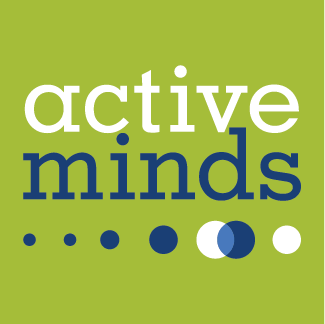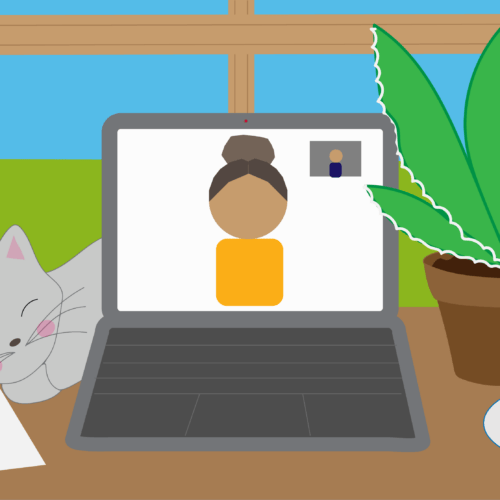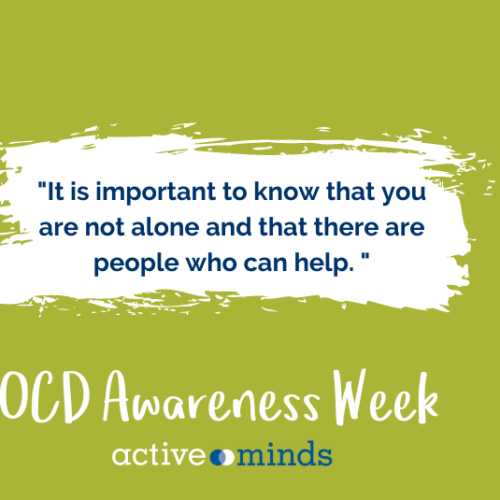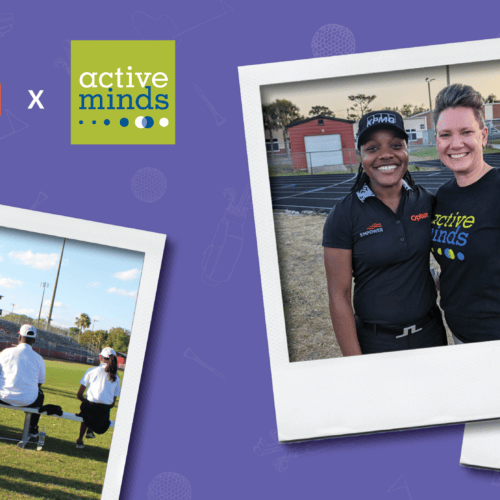Tips to Stay Mentally Well While Working From Home… from people who do it regularly
As members of Active Minds’ remote staff, we are experts at balancing the demands of a full-time job while still maintaining healthy boundaries between our work and personal life. As many of us transition to working (and learning!) from home, we wanted to pass along some of our favorite ways to counteract the stress that can come from this type of work set up, especially during times of change and uncertainty.
Below is a compiled list of tips for staying mentally well and focused while making the transition to remote work or school.
1. Create routines, both personal and work-related
Personal morning routine:
- Wake up at relatively the same time each day as if you were going into the office or class. Be sure to create time for yourself before you jump into school or work demands.
- If you usually commute or engage in self-care activities before heading into the office/class, continue to do that. Some ideas: set aside quiet time with coffee, snuggle your pet, listen to an inspiring podcast or your favorite music, read a chapter of a book, journal, stretch, exercise, get some sunshine
- In general, continue to do the things that you would do as if you were going into the office or school. When we get ourselves ready for the day, we tend to feel more focused and energized.
Work/school-related routine:
- Maintain a to-do list and highlight the three most important tasks or projects. To-do lists can easily become overwhelming if we find ourselves suddenly listing everything we feel we need to get done. Selecting the three most important items allows you to stay focused and tackle easy wins.
- Continue to celebrate wins by sharing with teammates or peers online as you would at the watercooler.
- Keep a regular schedule by time blocking and share your calendar with your co-workers or peers. Be realistic and honest about any new stressors added to your plate and ask for support where you need it.

2. Designate a regular, quiet workspace and keep it organized, inspirational, and clean
- Separate your workspace from spaces that are associated with leisure time.
- Post inspirational quotes or motivational messages near your desk.
- Include plants, natural light, candles, and other items that boost your mood in your workspace.
3. Meal prep and stay hydrated
- Take advantage of being able to make a hot meal on occasion.
- If you are used to grabbing meals on the go or don’t have time to make meals every day, have weekly lunches prepared in your refrigerator.
- Schedule regular meal times and incorporate healthy foods when available.
- Keep a refillable water bottle at your desk. Your mind and body need water to function properly.
4. Plan ahead and ask yourself:
- What office/school supplies do I need at home?
- What are my most productive times of the day? (Schedule meetings and projects accordingly.)
- What regular appointments do I have that I can carry over to digital meetings?
- What new challenges am I facing due to being remote that I should communicate to my supervisor or professor?
5. Take smart and mindful breaks

- Take a lunch break while including one of the following: practice mindful eating, take your lunch outside, or enjoy a virtual lunch with a colleague.
- Take quick breaks throughout the day as needed. Some examples:
– Re-energize by going for a walk or run outside or do a home workout video.
– Disconnect from electronics when you need a mental break.
– Meditate, pause, or reflect.
6. Set boundaries for yourself.
- Turn off your school or work email notifications after your designated hours.
- Delete distracting social media apps or set timers to promote periods of focus.
- Limit news and media exposure during your designated work hours.
- Designate a concrete end-time to your work or school day and do something to physically separate yourself from your work at the end of the day (take a walk, meditate, turn off your computer)
7. Set expectations with housemates, partners, and/or children (and sometimes pets)
- Designate an open workspace as well as a private space. Communicate or designate a system to not disturb or distract each other. Share schedules if needed.
- If caring for children, negotiate regular time blocks with your partner during important meetings, periods of focus, or classes.
- Your pet(s) are probably so happy and maybe confused that you are home so much. Do care for them, but focus on work too!
- If needed, develop a remote work/school buddy system, someone to check in with and help hold each other accountable.

8. Simulate things that you would normally do in the office or school such as:
- Face-to-face connection through video. Even if it’s just sharing a smile for a few minutes. Plan video meetings, digital coffee breaks, and check-ins to foster a greater sense of connectedness and community.
- Take a walk around your house and stretch your legs.
- Remember that you may not have the same amount of social interactions and oversight as you normally would have in the office or at school so make it a point to check in more frequently with your co-workers or peers.
9. Give yourself patience and grace with these changes.
- You should not expect to implement all of these recommendations at once nor should you expect to be perfect at creating these changes. Start small and evaluate which routines and habits work best for you. Try incorporating one new habit per week to start. And remember, it’s okay to have off-days.
Let us know what your favorite routines and habits are for staying mentally well while working or doing school from home!
For more tips & tricks to keep in mind during this time of social distancing, head to our mental health Resource Hub.







